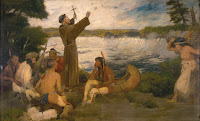
The Second Amendment protects “an individual’s right to carry a handgun for self-defense outside the home.”
I guess that includes the right of self-defense against first and second graders, especially if, as some lawmakers would like, the teachers are armed. Then killing the teachers really is self-defense.
In future cases, we should reconsider all of this Court's substantive due process precedents, including Griswold, Lawrence, and Obergefell.
And for the record, late Justice Scalia said of Justice Clarabell: "[He] doesn't believe in stare decisis, period."
Know what those cases are? Let me enlighten you.
- Griswold v. Connecticut, 381 U.S. 479 (1965), was a landmark decision of the U.S. Supreme Court in which the Court ruled that the Constitution of the United States protects the liberty of married couples to buy and use contraceptives without government restriction.The case involved a Connecticut "Comstock law" that prohibited any person from using "any drug, medicinal article or instrument for the purpose of preventing conception".
- Lawrence v. Texas, 539 U.S. 558 (2003), was a landmark decision of the U.S. Supreme Court in which the Court ruled that sanctions of criminal punishment for those who commit sodomy are unconstitutional.The Court reaffirmed the concept of a "right to privacy" that earlier cases, such as Roe v. Wade, had found the U.S. Constitution provides, even though it is not explicitly enumerated.The Court based its ruling on the notions of personal autonomy to define one's own relationships and of American traditions of non-interference with private sexual decisions between consenting adults.
- Obergefell v. Hodges, 576 U.S. 644 (2015) is a landmark civil rights case in which the Supreme Court of the United States ruled that the fundamental right to marry is guaranteed to same-sex couples by both the Due Process Clause and the Equal Protection Clause of the Fourteenth Amendment to the United States Constitution. The 5–4 ruling requires all fifty states, the District of Columbia, and the Insular Areas to perform and recognize the marriages of same-sex couples on the same terms and conditions as the marriages of opposite-sex couples, with all the accompanying rights and responsibilities. Prior to Obergefell, same-sex marriage had already been established by law, court ruling, or voter initiative in thirty-six states, the District of Columbia, and Guam.
- Loving v. Virginia, 388 U.S. 1 (1967), was a landmark civil rights decision of the U.S. Supreme Court in which the Court ruled that laws banning interracial marriage violate the Equal Protection and Due Process Clauses of the Fourteenth Amendment to the U.S. Constitution. Beginning in 2013, it was cited as precedent in U.S. federal court decisions holding restrictions on same-sex marriage in the United States unconstitutional, including in the 2015 Supreme Court decision Obergefell v. Hodges.
...a legal principle by which judges are obligated to respect the precedent established by prior decisions. The words originate from the phrasing of the principle in the Latin maxim Stare decisis et non quieta movere: "to stand by decisions and not disturb the undisturbed".[4] In a legal context, this means that courts should abide by precedent and not disturb settled matters. The principle can be divided into two components:
· A decision made by a superior court, or by the same court in an earlier decision, is binding precedent that the court itself and all its inferior courts must follow.
· A court may overturn its own precedent, but should do so only if a strong reason exists to do so, and even in that case, should be guided by principles from superior, lateral, and inferior courts.
Neil M. Gorsuch, during his 2017 confirmation hearings, said Roe was a 'a precedent of the U.S. Supreme Court. It was reaffirmed in Casey in 1992 and in several other cases.” Gorsuch was referring to Planned Parenthood v. Casey, the 1992 decision that affirmed Roe. 'So a good judge will consider it as precedent of the U.S. Supreme Court worthy as treatment of precedent like any other,” Gorsuch said.
Brett M. Kavanaugh during his 2018 confirmation hearing during his 2018 confirmation hearings, echoed Gorsuch by saying that Roe was an 'important precedent of the Supreme Court that has been reaffirmed many times.'
Barrett said she was committed to obeying “all the rules of stare decisis,” promising that “if a question comes up before me about whether Casey or any other case should be overruled, that I will follow the law of stare decisis, applying it as the court is articulating it, applying all the factors, reliance, workability, being undermined by later facts in law, just all the standard factors.”
In long intervals I have expressed an opinion on public issues whenever they appeared to me so bad and unfortunate that silence would have made me feel guilty of complicity.
He was right, y'know.
But it's so much easier to pretend it will all work itself out.
Be like Einstein.









